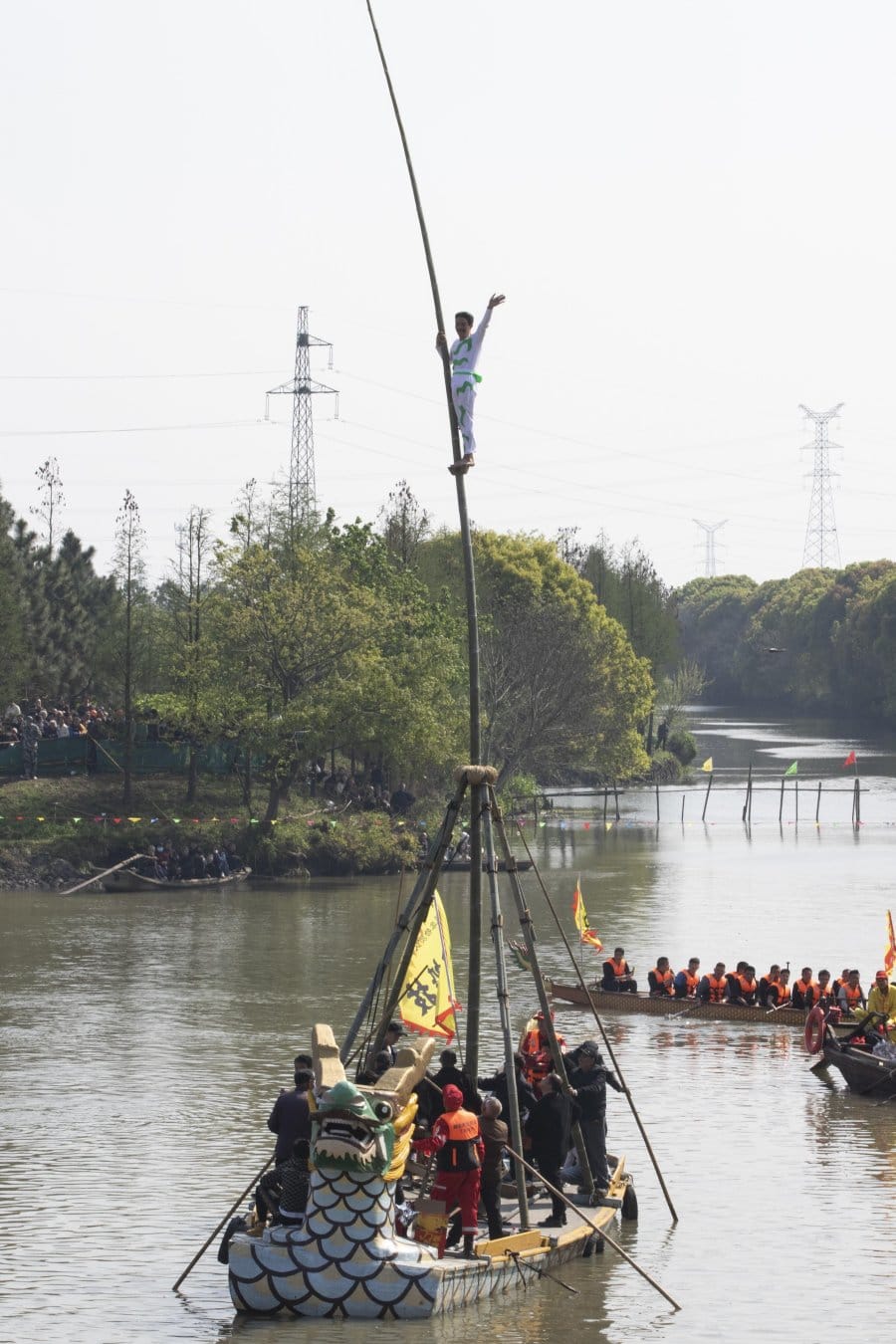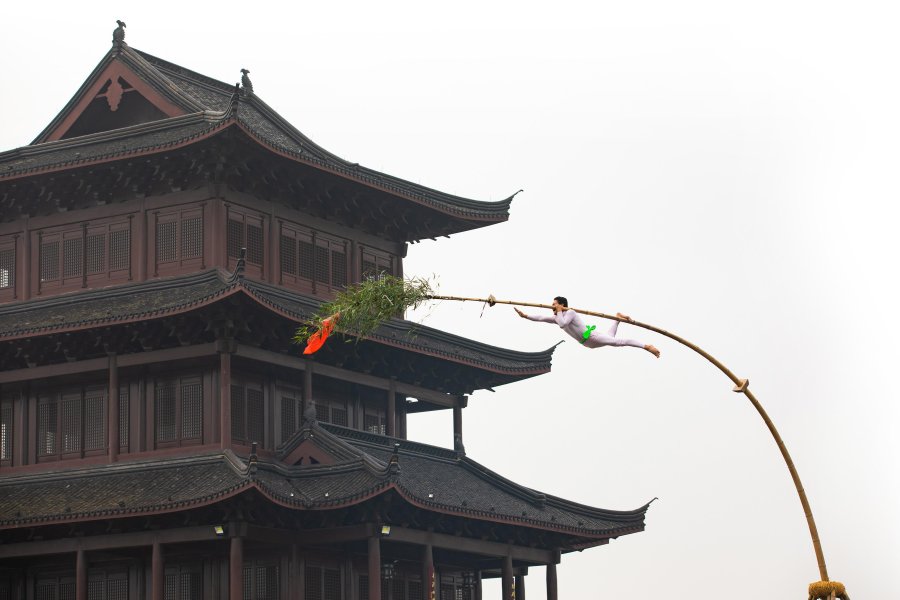May 9, 2023
BEIJING – Tu Songgen recently took his audience’s breath away at a historical folk celebration event in his hometown of Zhouquan in Tongxiang, a county-level city of Jiaxing, East China’s Zhejiang province.
Dressed in a white folk costume, Tu pulled off various stunts on top of a bamboo pole easily more than 10 meters high in a boat on the river.
He climbed to the top of the pole, one end of which was fastened to the boat — the other end reaching into the sky — before he started to spin and twist his lithe body around it.
Seen from afar, Tu looked as if strolling through the clouds. At times, he released his hands, lying on his back over the top of the pole. Then, he gave the audience a start by suddenly hooking his feet onto the end of it and hanging himself upside down.
His movements carried not just entertainment value, but a symbolic meaning — for example his embracing the bamboo pole with both arms imitated silkworms eating mulberry leaves and spinning silk.
With every new move, visitors cried out in amazement, and applause broke out at close intervals, creating an atmosphere of excitement during the Silkworm Flower Water Festival staged in the town’s Qinghe village in early April.
The festival gets its name from the practice of female silkworm farmers adorning themselves with colorful flowers made of silk. Harvest offerings are also made as part of the celebrations.
Widely recognized for its waterborne acrobatics, the boat show is also closely related to local silkworm culture and is a highlight of the annual festival, which has a history of more than 800 years.
Since ancient times, the water festival has been a popular cultural and sports activity in the Jiaxing region, which is renowned for silkworm farming. The silkworm farmers in Zhouquan would spontaneously organize these folk festivities to worship the silkworm goddess and pray for a good harvest during the Qingming Festival, also called Tomb Sweeping Day, in early April, every year.
“Tumbling on the bamboo pole is not only a show of skills but also a prayer for a bountiful life,” Tu says.

Tu Songgen displays his skill during his bamboo pole performance that has been a highlight of the historical Silkworm Flower Water Festival in Tongxiang, Zhejiang province. (PHOTO PROVIDED TO CHINA DAILY)
A family heirloom
Such acrobatic boat performances thrived in the late Qing Dynasty (1644-1911). In modern times, they have been recognized for their value, and were named a national intangible cultural heritage by the State Council in 2011.
The whole set of performances, lasting about 10 minutes in total, involves more than 20 different moves, all of which need to be delivered smoothly and artistically, according to Tu.
“Due to gravity, the bamboo pole will bend almost 90 degrees toward the surface of the river, swaying up and down in the air and giving the activity a relatively high degree of danger,” Tu says.
More than two decades of putting on the intense show has rendered Tu’s body sinewy and tough. Though in his 50s, he is muscularly fit. His thick hair remains largely black.
He says the boat show not only helps him maintain a healthy physique but also gives him an immense sense of satisfaction.
Walking into his home in Zhouquan, a feature that immediately catches the eye is a long steel pole standing upright on the ground.
Every morning and evening, Tu goes through his performance routine on this spot.
“When the weather is good, I also go to the fields and find a tree to tie a bamboo pole to and practice outdoors,” he says.
Tu has been exposed to the art form since childhood, when his father and grandfather would tell him about the glories of acrobatic performance. Yet, the annual water festival was halted for several decades after around 1950, causing its associated practices to stagnate.
However, their accounts piqued Tu’s curiosity and he insisted on his father and grandfather showing him the moves. “I watched them perform and practice, and gradually picked up the fundamental skills,” he says.
Although he only got to scratch the surface of the art in those early years, it planted the seeds of interest in his heart.
After being discharged from the military in 1998, Tu needed to plan out a new future as a civilian, and decided he would try to make a career out of his family feat.
“It (the boat show) just came to my mind,” he says, adding that he had noticed the decline of the performance. “I also felt it was a shame that such a spectacular skill passed down by our ancestors was on the verge of extinction.”
He then returned home, cut his own bamboo pole, and found a venue to practice in on a daily basis. He got off to a rough start, however, as few people understood why he would so doggedly pursue a dying art.
“At that time, many people laughed at me and thought that my doing this was meaningless,” he recalls. “It was a helpless situation.”
Not only did Tu feel frustrated about people’s underwhelming enthusiasm, he also struggled to hone his skills. “When I got down to it, I realized that the moves were not as easy as I had imagined they would be,” he admits.
At the beginning, he encountered difficulties with the level of coordination and strength required of his body.
“It was a test of my body and willpower, climbing to the top of the pole and completing the entire set of movements,” he says.
But he was committed to a daily routine of strict training, and committed himself to daily practice of the show.
He says he lost count of the number of times he fell from the bamboo pole. His hands are covered in calluses from its rough bark.

Tu Songgen displays his skill during his bamboo pole performance that has been a highlight of the historical Silkworm Flower Water Festival in Tongxiang, Zhejiang province. (PHOTO PROVIDED TO CHINA DAILY)
A group effort
Moved by Tu’s persistence, a few locals also joined in, forming a high-pole boat performance squad.
Their efforts aroused the enthusiasm of other folk art practitioners, and together they began to prepare to put on the festival once again, which was resurrected in 1999.
The long-awaited holiday turned out to be a sensational success, and packed in a huge crowd of visitors.
Tu and his squad eventually got to show the boat performance in full before the public. “I can still remember the cheers and applause that day,” he says.
In the early days after the festival’s resumption, only a small number of people would engage in high-pole boat acrobatics due to the high risks and physical requirements involved. “Not only that, there was not much income to be gained from doing it,” Tu explains.
Fortunately, the Zhouquan authorities recognized the cultural value of such performances and began to provide support to Tu, helping to apply to higher authorities to have his art listed as an intangible cultural heritage, guaranteeing patronage and protection.
As the feat has come to the attention of the nation, so has Tu and his co-performers.
Tu has since been invited to deliver performances on programs broadcast by China Central Television and the Beijing Radio and Television Station. He has also been invited to perform at scenic spots across Zhejiang province and the neighboring Jiangsu province, and has been named a provincial inheritor of the intangible cultural heritage in Zhejiang.
Young people who have a daredevil spirit have also made their way to Tu’s door and asked for training. Luo Huawen from Southwest China’s Sichuan province was one of them.
“I was drawn to the stunning performance when I watched it the first time more than a decade ago,” says the man, now in his 30s.
Under Tu’s guidance, Luo has come up with innovative moves that have added to the charm of the boat show.
Tu speaks highly of Luo’s efforts and says he hopes more of his disciples can do the same and help simultaneously carry forward and adapt the craft.
As he has gotten older, Tu has had to reduce the frequency of his performances, but he says he will continue to participate in the Silkworm Flower Water Festival.
“I just feel happy to perform for my fellow villagers,” he says.


